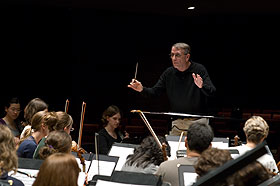  |
| HOME | THIS ISSUE | CALENDAR | GRANTS | BACK ISSUES | < BACK | NEXT > |
Once hidden musical composition will premiere at UConnby Robert Frahm - October 6, 2008
|
||||
| A Chinese composer who hid his music from authorities during China’s Cultural Revolution will realize a dream this week, when UConn musicians perform his lone surviving composition. More than four decades after Lu Wei began work on D-C-A-C: Variations on a Chinese Folk Song, the University Symphony Orchestra will give the world premiere performance of the composition Oct. 10 at von der Mehden Recital Hall. Because of his age and concerns about his health, the 88-year-old composer declined UConn’s offer to bring him to Storrs for the performance, but he said the concert will fulfill a lifelong wish to have his music performed. UConn officials learned of the composition from Yuhang Rong, an assistant dean in the Neag School of Education and a relative of the composer. “I had it sitting in my study for a few years,” says Rong, who had been given a copy of the musical score by his mother in hopes he could find someone to perform it. Rong discussed the idea last year with David Woods, dean of the School of Fine Arts. Woods asked to see the manuscript. “I thought it really had a lot of merit – not only musical merit, but merit with UConn’s commitment to human rights,” Woods says. The concert coincides with the opening of a three-day conference organized by the University’s Human Rights Institute. Born in China, Lu Wei lived in France from 1946 to 1955, and taught composition at the Shanghai Conservatory of Music after returning to his home country. Like many Chinese intellectuals and artists during the Cultural Revolution, Lu Wei risked persecution by Chairman Mao Zedong’s Red Guards for any work deemed not to serve the interests of the state. According to Rong, Lu Wei longed for the freedom to compose but knew that creative work could not be accomplished under the watch of the authoritarian regime. He began writing his composition in 1966, re-interpreting a familiar Chinese folk song as a song of hope for a brighter future. Fearing his work could be seen by authorities as subversive, he asked a relative – Rong’s uncle– to hide it.
Although the composition remained hidden, Lu Wei’s house was searched, and he was imprisoned for “illegally listening to the enemy’s radio broadcasts” from France, the United Kingdom, and the United States, according to biographical notes written by Rong. Later, Lu Wei was labeled a “counter-revolutionary class enemy” and ordered to work as a janitor during the 1960s and ’70s at the Shanghai Conservatory of Music. It was there, in a janitor’s closet, that he secretly finished orchestrating his composition, Rong said. The composition is a challenging piece that “will be a bit of an unusual experience for most listeners,” says music professor Jeffrey Renshaw, conductor of the University Symphony Orchestra. “This is one of the things we do both with the orchestra and wind ensemble – a lot of contemporary music, a lot of premieres,” he said. Part of the challenge is that Lu’s score is a handwritten manuscript, unlike the more precise computer-generated manuscripts commonly used by modern orchestras. “There’s a great deal of time figuring out what notes are on the page, and what notes did he mean to have,” Renshaw says. “It’s a lot of detective work.” Lu Wei’s composition is an 11-minute piece, starting with the folk tune “stated in its original form and energy” and followed by variations ranging “from very serene and beautiful to something very dissonant,” Renshaw says. Friday’s concert begins at 8 p.m. In addition to Lu Wei’s work, the symphony orchestra also will perform Richard Wagner’s Dawn and Siegfried’s Rhine Journey and Igor Stravinsky’s Firebird Suite. Officials plan to send a recording of the concert to Lu Wei. Earlier this year, Rong was in China and met Lu Wei to discuss plans for the concert. Through Rong, Lu Lu Wei sent a message to Woods and the University: “Please tell the dean, UConn has filled this poor old man’s heart with joy. I feel as if I am the richest person on earth.” |
| ADVANCE HOME UCONN HOME |

